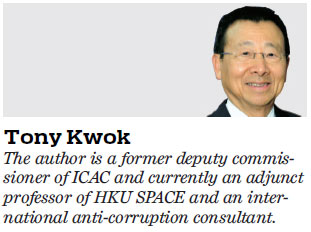HK remains corruption-free after 20 years
Updated: 2017-07-02 14:35
By Tony Kwok(HK Edition)
|
|||||||
In 1997 there was widespread speculation among both local and Western media that corruption would escalate in Hong Kong after its handover, and the Independent Commission Against Corruption (ICAC) would lose its effectiveness and independence. There was also a widely perceived "1997 quick-buck syndrome" speculating that people might try to exploit loopholes, legal or otherwise, to make a fast fortune before deserting Hong Kong. Many predicted Hong Kong would degenerate from an "Island of Integrity" into a "corrupt capital"!
I must admit that this presented for me the biggest challenge in my career, having been appointed as the first local officer to head the Operations Department of ICAC shortly before the handover.

Fortunately, the commission, especially its investigative workforce, was undaunted by these challenges. It responded splendidly by successfully completing a series of daring investigations. In the first three years after the handover, between 1998 and 2000, a total of 1,494 persons were prosecuted by ICAC. Many of these cases attracted intense media coverage and public interest. They include, in the government sector, an expatriate head of the Government Printing Department prosecuted for breach of trust; a joint police-ICAC investigation on corruption involving the police promotion board; land fraud concerning "ding" rights of indigenous villagers; customs corruption in protecting counterfeit VCD production; soccer fixing; horse-race fixing associated with illegal off course betting; election vote planting; construction scandals involving short piling in public housing and other serious breaches of trust cases affecting public interest. In the private sector, there were a number of high-profile prosecutions affecting financial and insurance institutions, including Chinese mainland banks, State-owned enterprises as well as a major United States investment company - Rockefeller & Co. All these are major entities. Those prosecuted included Hong Kong citizens, mainlanders, foreigners, even foreign diplomats and staff from foreign consulates in Hong Kong. There were also successful extraditions of fugitives, who had previously absconded with the "quick buck syndrome" before the handover.
All these high-profile cases fully demonstrated ICAC's continued effectiveness in its pursuit of corrupt offenders. The independent enforcement arm of ICAC was so relentless that the then commissioner Lily Yam Kwan Pui-ying was given the sobriquet of "Iron Butterfly". But the most important factor for its success was the support of the first chief executive Tung Chee-hwa, who really appreciated the crucial role of ICAC to ensure a successful transition. He saw to it that the independence of the commission was not compromised and ensured the commission had adequate resources to fulfill its mission. For example, he endorsed the construction of a purpose-built new ICAC Headquarters in North Point despite the then economic recession which had put many government projects on hold.
However, in recent years, politically motivated criticisms are being aired alleging that corruption in Hong Kong has become worse. The criticism emanating mainly from the opposition parties is focused primarily on some sensational corruption scandals such as the cases of former chief executive Donald Tsang Yam-kuen and former chief secretary Rafael Hui Si-yan. This gave the false impression that corruption after the handover has become more prevalent. To be fair, those are exceptional corruption cases which can happen in any jurisdiction, but the fact that the highest officials in the land can be brought to book only underscores the independence of ICAC and its determination to stamp out corruption wherever it is found without fear or favor.
If we want to look at the corruption situation in Hong Kong objectively, we can refer to some international corruption assessment indices. According to the Transparency International's annual Corruption Perceptions Index, in its latest report issued last year, Hong Kong is rated as the 15th most corruption-free place in the world with an assessment mark of 77, the highest mark in the past four years. In another authoritative assessment, The TRACE International's TRACE Matrix, which measures countries' corruption risk, last year rated Hong Kong as the fourth least-corrupt risk place in the world, better than Singapore!
But one of the most scientific studies of the degree of corruption prevalence is the ICAC's own independent annual opinion survey. Last year out of 1,500 local respondents, only 1.2 percent said they had come across corruption, against the world average of 27 percent. This percentage is also the lowest since 2013. The logical conclusion is that Hong Kong has remained remarkably corruption-free in the 20 years after handover.
So what are the main future challenges for ICAC? The biggest in my view is to prevent Hong Kong from becoming a refuge for corrupt mainland officials. It is long overdue for Hong Kong and the mainland to strike an official Mutual Legal Assistance Agreement to facilitate closer law-enforcement cooperation in corrupt asset recovery and rendition of corrupt offenders. The ability to maintain integrity in both Hong Kong and the mainland is the strongest pillar of the "one country, two systems".
(HK Edition 07/02/2017 page7)